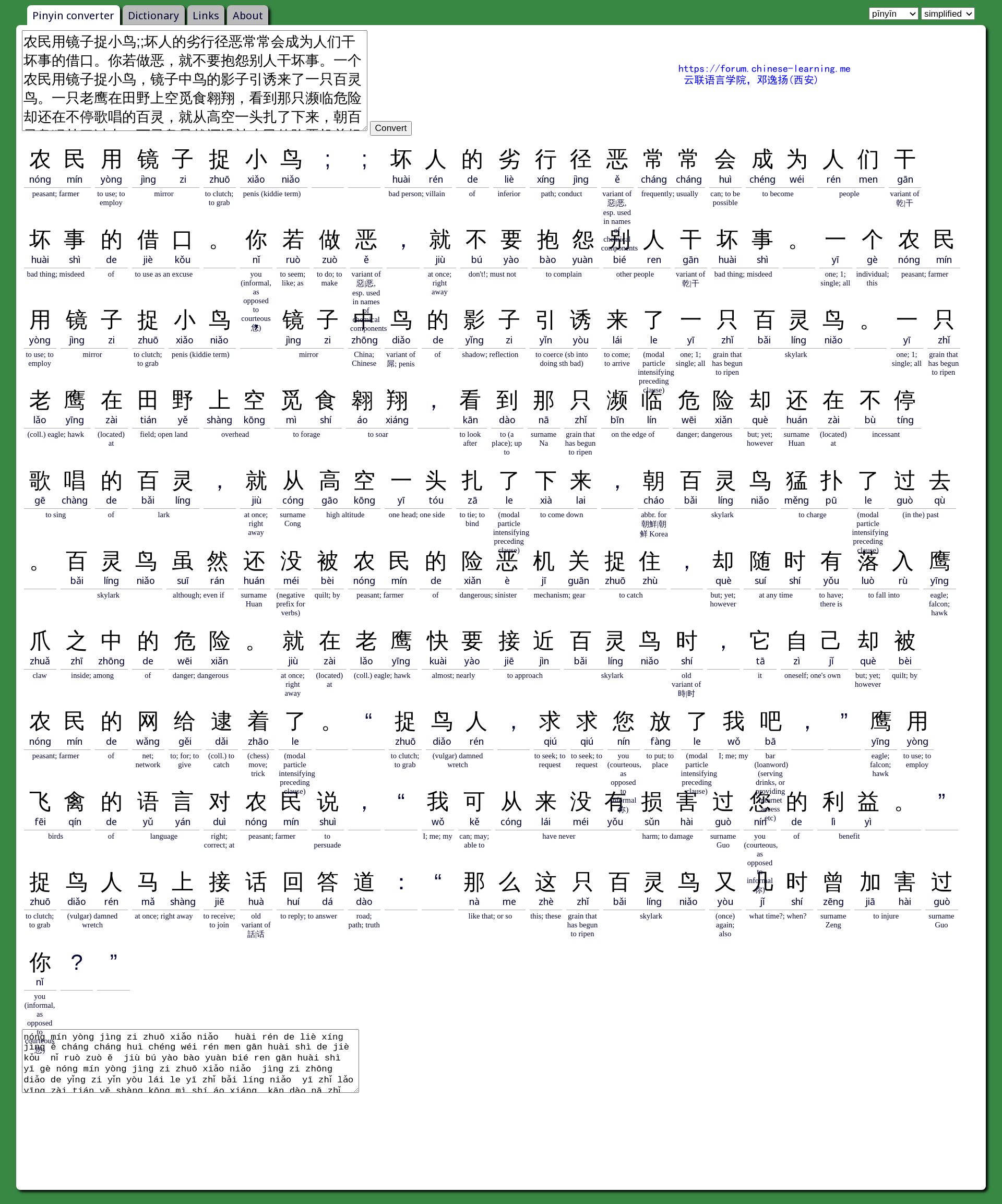
Show Pīnyīn
坏人的劣行径恶常常会成为人们干坏事的借口。你若做恶,就不要抱怨别人干坏事。
一个农民用镜子捉小鸟,镜子中鸟的影子引诱来了一只百灵鸟。一只老鹰在田野上空觅食翱翔,看到那只濒临危险却还在不停歌唱的百灵,就从高空一头扎了下来,朝百灵鸟猛扑了过去。百灵鸟虽然还没被农民的险恶机关捉住,却随时有落入鹰爪之中的危险。就在老鹰快要接近百灵鸟时,它自己却被农民的网给逮着了。
“捉鸟人,求求您放了我吧,”鹰用飞禽的语言对农民说,“我可从来没有损害过您的利益。”
捉鸟人马上接话回答道:“那么这只百灵鸟又几时曾加害过你?”
huàirén de liè xíngjìng è chángcháng huì chéngwéi rénmen gānhuàishì de jièkǒu 。 nǐ ruò zuò è , jiù bùyào bàoyuàn biéren gānhuàishì 。
yīgè nóngmín yòng jìngzi zhuō xiǎoniǎo , jìngzi zhōngniǎo de yǐngzi yǐnyòu lái le yīzhī bǎilíngniǎo 。 yīzhī lǎoyīng zài tiányě shàngkōng mìshí áoxiáng , kàndào nà zhǐ bīnlín wēixiǎn què huán zài bùtíng gēchàng de bǎilíng , jiù cóng gāokōng yītóu zhā le xiàlai , cháo bǎilíngniǎo měngpū le guòqu 。 bǎilíngniǎo suīrán huán méi bèi nóngmín de xiǎnè jīguān zhuōzhù , què suíshí yǒu luòrù yīngzhuǎ zhīzhōng de wēixiǎn 。 jiù zài lǎoyīng kuàiyào jiējìn bǎilíngniǎo shí , tā zìjǐ què bèi nóngmín de wǎng gěi dài zhe le 。
“ zhuō niǎo rén , qiúqiu nín fàng le wǒ bā , ” yīngyòng fēiqín de yǔyán duì nóngmín shuō , “ wǒ kě cónglái méiyǒu sǔnhài guò nín de lìyì 。 ”
zhuōniǎo rénmǎ shàng jiēhuà huídá dào : “ nàme zhè zhǐ bǎilíngniǎo yòu jǐshí zēng jiāhài guò nǐ ? ”

The bad deeds of bad people are often an excuse for people to do bad things. If you do evil, don't complain about others doing evil.
A farmer catches birds with a mirror, and the shadow of the bird in the mirror lures a lark. An eagle was looking for food and soaring over the field. When it saw the lark that was in danger but was still singing, it plunged down from the sky and swooped towards the lark. Although the lark has not been caught by the peasant's sinister trap, it is always in danger of falling into the eagle's claws. Just as the eagle was getting close to the lark, it was caught in the farmer's net.
"Bird catcher, please let me go," the eagle said to the farmer in the language of birds, "I have never harmed your interests."
The bird catcher answered immediately, "Then when did this lark harm you?".
Las malas acciones de la gente mala son a menudo una excusa para que la gente haga cosas malas. Si haces el mal, no te quejes de que otros hagan el mal.
Un granjero atrapa pájaros con un espejo, y la sombra del pájaro en el espejo atrae a una alondra. Un águila estaba buscando comida y volaba sobre el campo, cuando vio la alondra que estaba en peligro pero aún cantaba, se precipitó desde el cielo y se abalanzó hacia la alondra. Aunque la alondra no ha sido atrapada por la siniestra trampa del campesino, corre peligro de caer en las garras del águila en cualquier momento. Justo cuando el águila se acercaba a la alondra, fue atrapada en la red del granjero.
"Atrapador de pájaros, por favor, déjame ir", le dijo el águila al granjero en el lenguaje de los pájaros, "nunca he dañado tus intereses".
El cazador de pájaros respondió de inmediato: "Entonces, ¿cuándo te hizo daño esta alondra?".
Les mauvaises actions des mauvaises personnes sont souvent une excuse pour que les gens fassent de mauvaises choses. Si vous faites le mal, ne vous plaignez pas des autres qui font le mal.
Un fermier attrape des oiseaux avec un miroir et l'ombre de l'oiseau dans le miroir attire une alouette. Un aigle cherchait de la nourriture et planait au-dessus du champ.Quand il a vu l'alouette qui était en danger mais qui chantait toujours, il a plongé du ciel et s'est dirigé vers l'alouette. Bien que l'alouette n'ait pas été prise par le sinistre piège du paysan, elle risque de tomber à tout moment dans les griffes de l'aigle. Au moment où l'aigle s'approchait de l'alouette, celle-ci fut prise dans le filet du fermier.
"Attrapeur d'oiseaux, s'il vous plaît, laissez-moi partir", dit l'aigle au fermier dans le langage des oiseaux, "je n'ai jamais nui à vos intérêts."
L'attrapeur d'oiseaux répondit immédiatement : "Alors, quand cette alouette t'a-t-elle fait du mal ?".
悪い人の悪い行いは、悪いことをする言い訳になることがよくあります。あなたが悪いことをしたら、他の人が悪いことをしても文句を言わないでください。
農夫が鏡で鳥を捕まえ、鏡に映る鳥の影がヒバリを誘う。鷲が餌を求めて野原を舞い上がっていたが、危ないのにさえずっているヒバリを見ると、空から舞い降りてヒバリに向かって急降下した。ひばりは百姓の邪悪な罠にかかったことはありませんが、いつでも鷲の爪にかかる危険があります。ワシがヒバリに近づいたちょうどその時、農家の網にかかりました。
「鳥捕りさん、私を放してください」と鷲は農夫に鳥の言葉で言いました。
バードキャッチャーはすぐに答えました。
Die schlechten Taten schlechter Menschen sind oft eine Entschuldigung für Menschen, schlechte Dinge zu tun. Wenn du Böses tust, beschwere dich nicht darüber, dass andere Böses tun.
Ein Bauer fängt Vögel mit einem Spiegel, und der Schatten des Vogels im Spiegel lockt eine Lerche an. Ein Adler suchte Futter und flog über das Feld, als er die bedrohte, aber noch singende Lerche sah, stürzte er vom Himmel herab und stürzte auf die Lerche zu. Obwohl die Lerche nicht in die finstere Falle des Bauern geraten ist, besteht jederzeit die Gefahr, in die Klauen des Adlers zu geraten. Gerade als der Adler sich der Lerche näherte, verfing er sich im Netz des Bauern.
"Vogelfänger, bitte lass mich gehen", sagte der Adler in der Sprache der Vögel zum Bauern, "ich habe deinen Interessen nie geschadet."
Der Vogelfänger antwortete sofort: "Wann hat dir diese Lerche denn geschadet?".